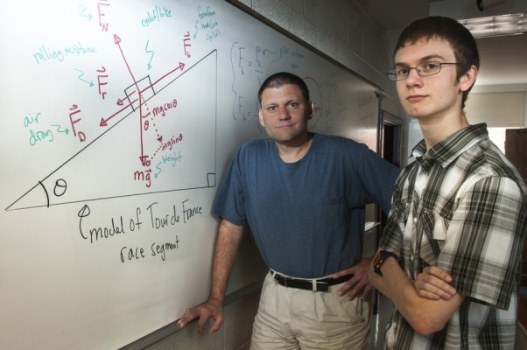 Brian Ramsey ’15 and Dr. John Eric Goff, professor of physics, are once again predicting the winning times for each stage of the Tour de France, which begins June 29 and ends July 21. The 100th Tour de France is made up of 21 stages and covers a distance of 3,404 kilometers. Using physics, Dr. Goff and Brian will predict the optimal time each stage should take.
Brian Ramsey ’15 and Dr. John Eric Goff, professor of physics, are once again predicting the winning times for each stage of the Tour de France, which begins June 29 and ends July 21. The 100th Tour de France is made up of 21 stages and covers a distance of 3,404 kilometers. Using physics, Dr. Goff and Brian will predict the optimal time each stage should take.
Author of Gold Medal Physics: The Science of Sports, Dr. Goff is providing commentary on his blog, where you can follow their predictions, which will be posted the day before each stage.
Brian, a math and physics double major from Evington, Va., received the Virginia Foundation for Independent Colleges (VFIC) William E. Betts Jr. Undergraduate Science Research Fellowship Award to expand on research completed in 2012. Under Dr. Goff’s guidance, Brian will develop an empirically-determined continuous power model for a typical elite Tour de France cyclist.
“It’s pretty neat,” Brian said. “It gives me a chance to see how the world works in scientific terms.”
This is the sixth year Dr. Goff has predicted winning times for the Tour de France. During the last two years, he said the predictions came pretty close. “If there’s a crash or it’s raining, that’s always a good explanation of why we might be a little bit off,” he said, noting that one year a strong tailwind significantly reduced the cyclists’ times.
Dr. Goff, who is working on a textbook on the physics of sports, will teach a general education class this fall on the physics of sports for the first time at University of Lynchburg. He has presented at international conferences on the subject and is often sought by the media to explain how athletes are physically able to do what they do.

